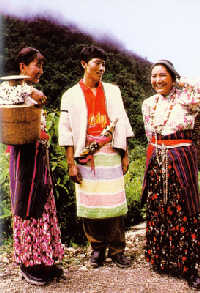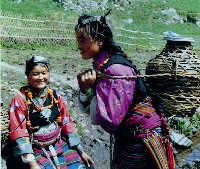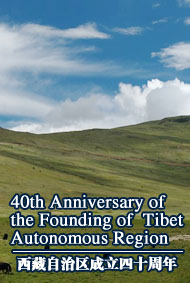|
Sherpa People
( 2005-10-27 )
 The Sherpa people are concentrated in Chentang in Dinggye County as well as Zham and other areas that border Nepal. The term "Sherpa" translates literally into "easterner," referring to their origins in eastern Tibet. The Sherpa people are concentrated in Chentang in Dinggye County as well as Zham and other areas that border Nepal. The term "Sherpa" translates literally into "easterner," referring to their origins in eastern Tibet.
In ancient times, the Sherpas lived a peaceful life, independent from Tibetan warlords. They have their own language similar to the Tibetan language. They can also speak, read, and write Tibetan.
Sherpas believe inBuddhismas well as animism. Their religious culture has evolved from thousands of years of myths, stories, and strong religious practice.
The Sherpa culture is distinctly different from the other ethnic groups of China. Though originally from Tibet, Tibetans and Sherpas are culturally very different from each other.
The Sherpa food is derived from high-altitude crops such as potatoes, barley, and buckwheat. Rice and Tibetan Zamba are also the staples of Sherpa diet.
They are divided into five surnames; marriage within the same surname is taboo. Their homes are two-storywooden structures. Both Sherpa men and women wear white woolen short-sleeved coats edged in black.
 The history of Sherpas was not well known until the early 20th century when they first became prominent to Westerners as British mountaineers set their sites on conquering Himalayan peaks. With the first Mt. Everest expedition in 1921, the skill, expertise, honesty, and dedication of Sherpas impressed the English climbers. From that point on, Sherpas became an integral part of international Himalayan climbing as guides and partners. The history of Sherpas was not well known until the early 20th century when they first became prominent to Westerners as British mountaineers set their sites on conquering Himalayan peaks. With the first Mt. Everest expedition in 1921, the skill, expertise, honesty, and dedication of Sherpas impressed the English climbers. From that point on, Sherpas became an integral part of international Himalayan climbing as guides and partners.
Noted for the gifted talent of high mountain climbing, they are the best guides for Mount Everest climbing. In fact, Sherpas have taken part in every expedition to Everest since 1921. Some Sherpas who work in trekking and mountaineering can speak English, German, French, Italian, Dutch, Spanish, Portuguese, Swedish, Korean, Chinese, and Japanese.
For centuries prior to the British expeditions, Sherpas revered the great mountains of their region as dwelling places of gods and goddesses. The very thought of climbing them was considered blasphemous.
With more and more cultural exchange with the outside world, they gradually accepted the mantle of the sport's glories -- and its tragedies. This was a radical change from their traditional roles as traders and farmers with heavy emphasis on religion. While these ancestral roles remain a staple of Sherpa life, the leading of climbs and treks has become a mainstay of their economy.
|

